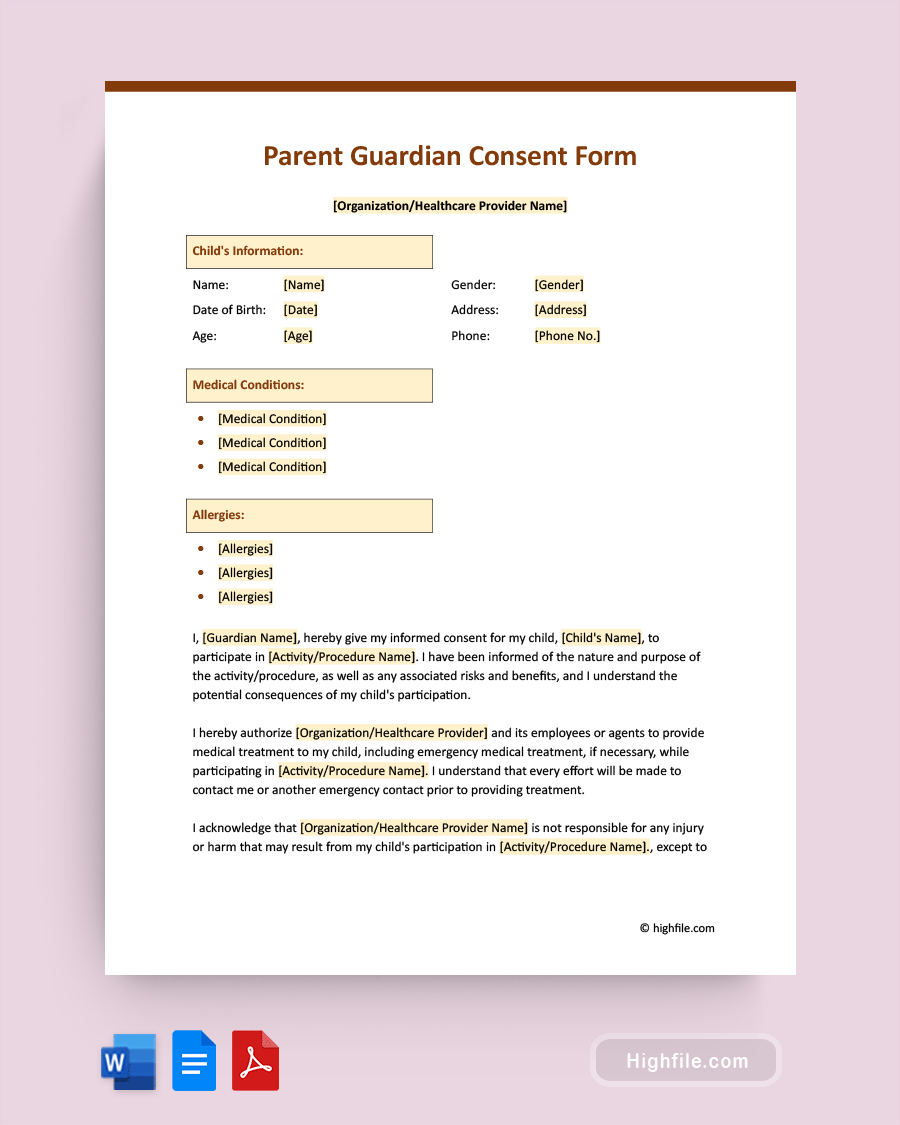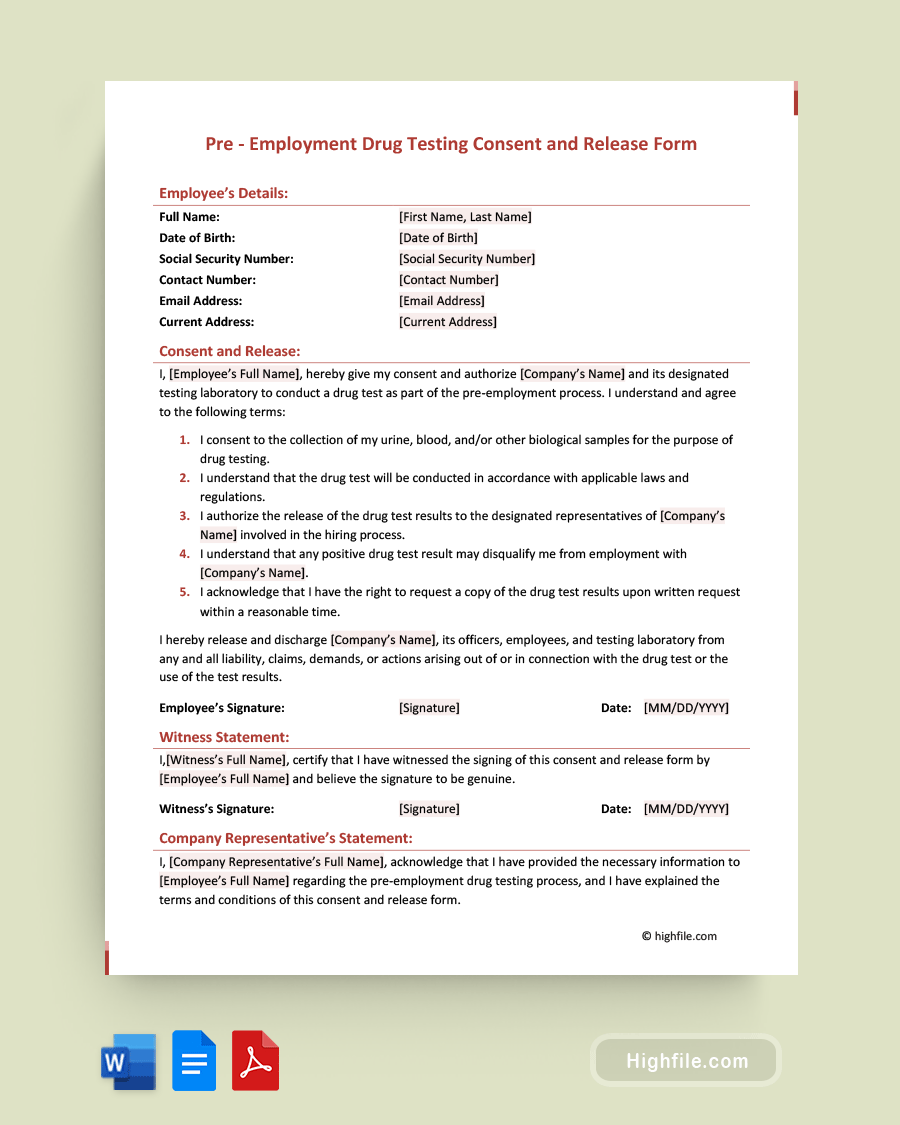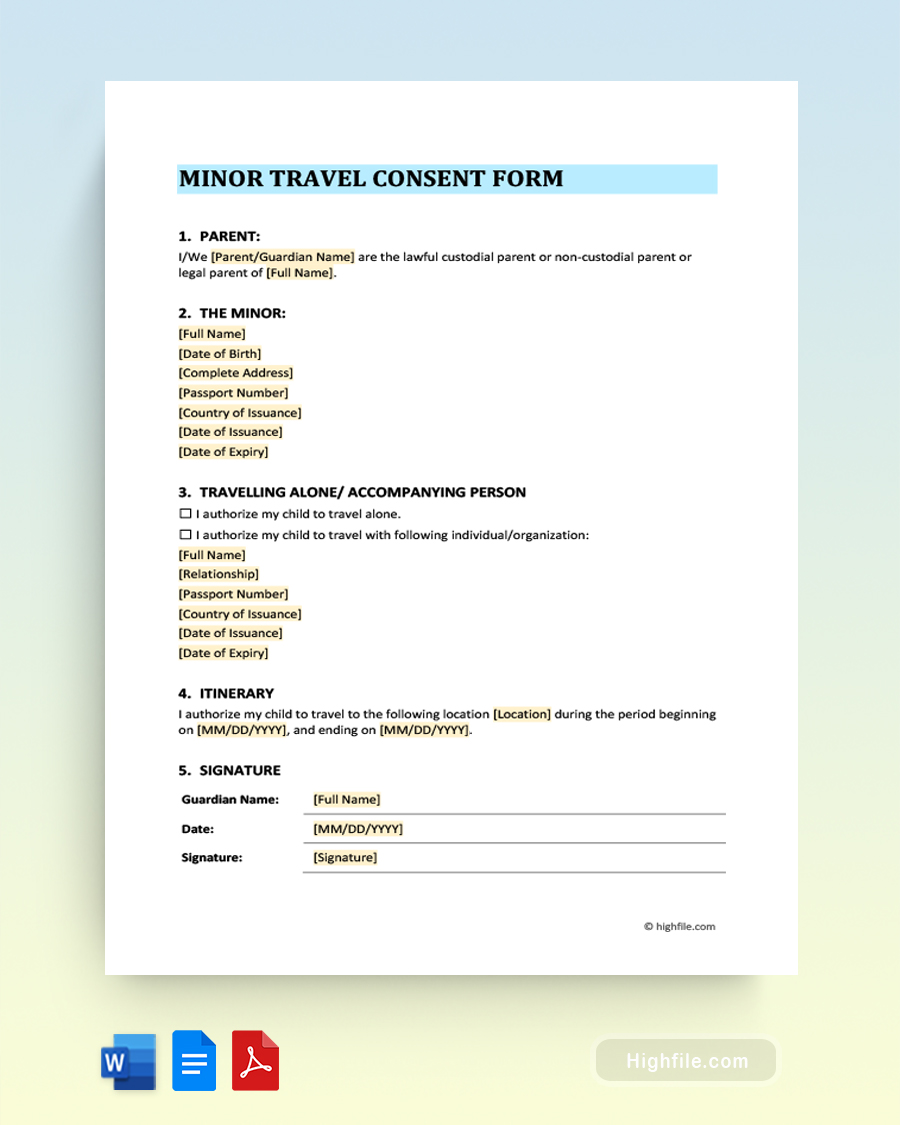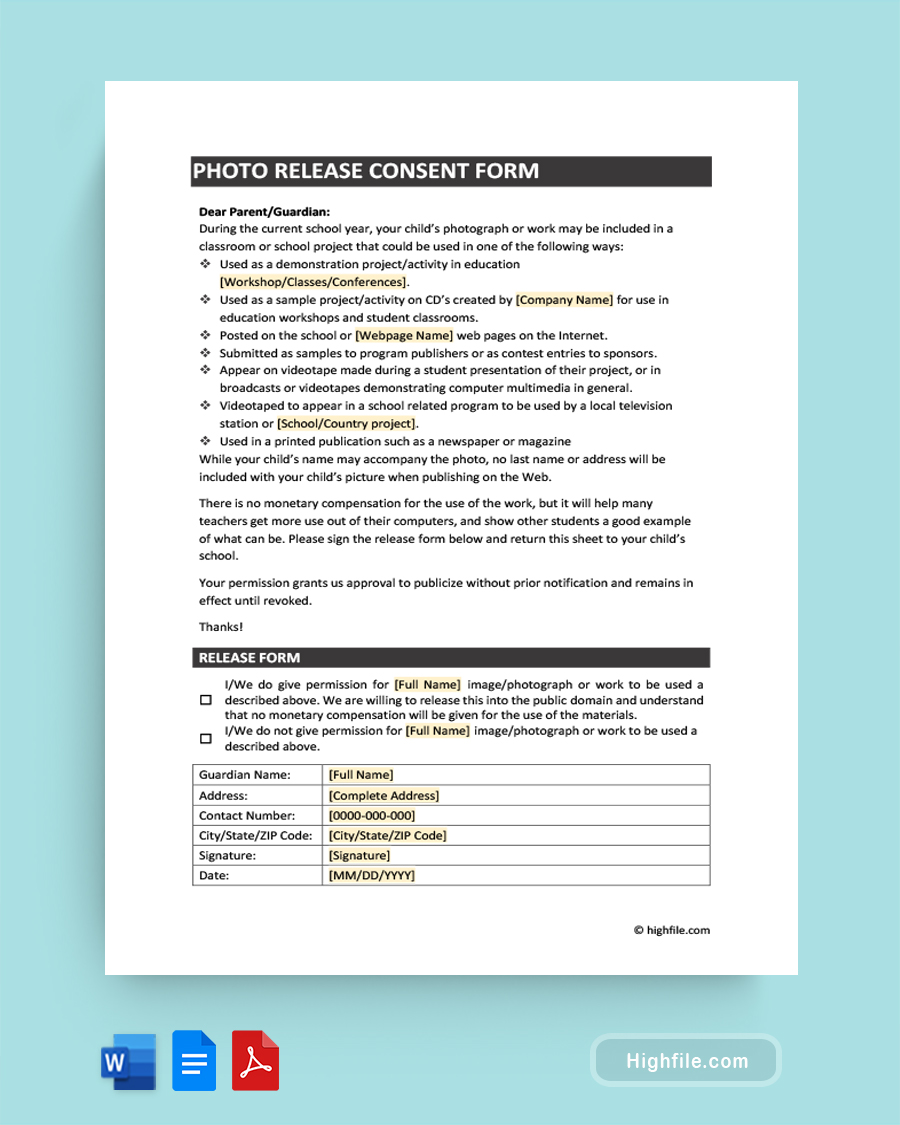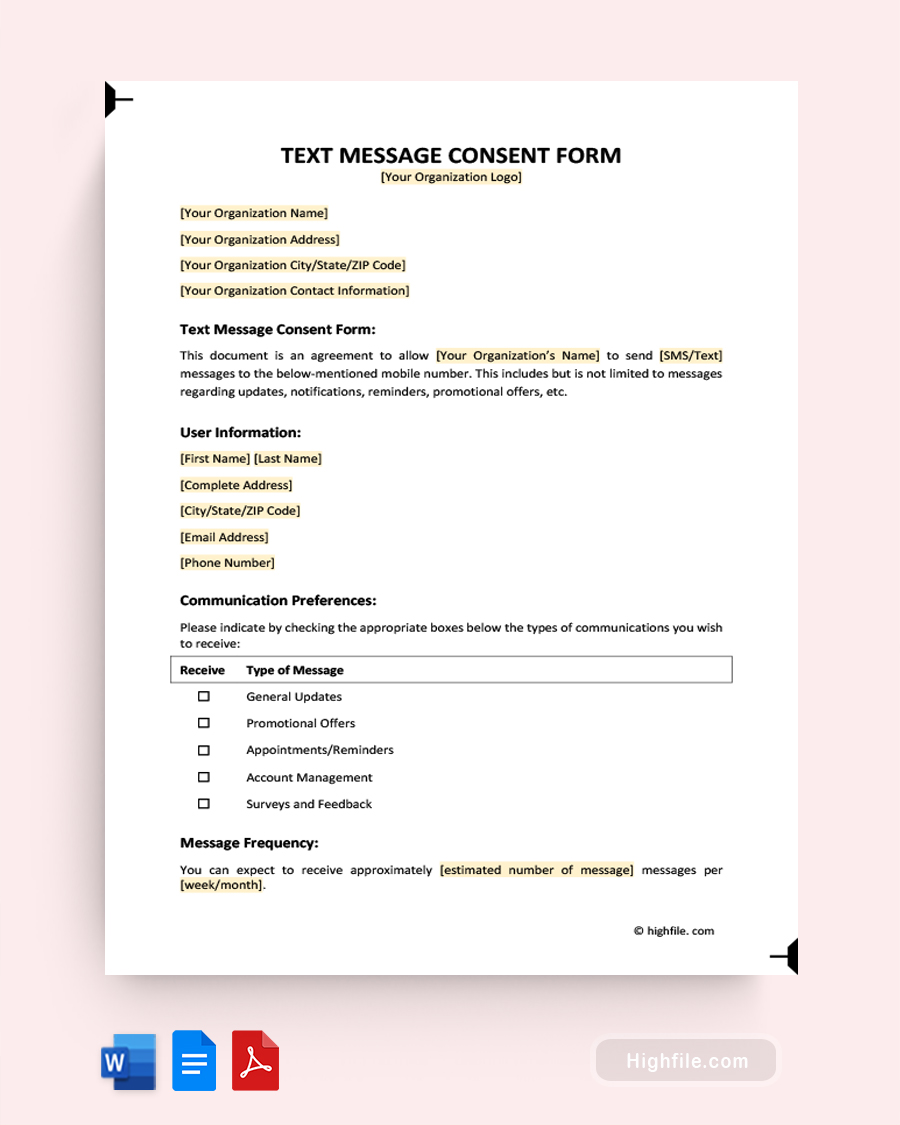A Parent Guardian Consent Form should be issued when a minor (under 18 years of age) is involved in any activity, event, or project that requires their parent or guardian’s approval and authorization. This may include activities such as school trips, exchange programs, research studies, or medical procedures. The form is used to ensure the parent or guardian has the necessary information to understand the risks and responsibilities associated with the activity, event, or project. We recommend using a professionally created Parent Guardian Consent Form template to save time and ensure that children are safe and legally allowed to participate.
What Is a Parent Guardian Consent Form?
A Parent Guardian Consent Form is a document that is used to obtain permission from a parent or guardian for a minor to partake in activities such as travel, medical care, extracurricular activities, or to be able to access certain services. The form should include the parent or guardian’s name, address, contact information, minor’s name, date of birth, medical and allergy information, and an emergency contact. It should also include the purpose of the request, any relevant details about the activity or service being requested, and the terms and conditions for consent.
Why Is Parent Guardian Consent Form Important?
Parent guardian consent forms are important documents used to protect the safety and privacy of children, particularly those under the age of 18. A consent form allows parents or guardians to permit their child to participate in a specific activity or event. Here are other reasons why these documents are essential:
- It informs parents or guardians about the activity or event.
- Consent forms provide legal protection for everyone involved in an activity or event.
- It gives the bearer of the permission consent to get emergency medical treatment for the child.
- Requiring a parent or guardian’s signature on the form ensures that the child is participating with permission from their parent or guardian.
- It also helps to ensure that the parent or guardian knows the risks involved in their child participating in a particular activity.
- Finally, it encourages an open dialogue with parents and guardians. Sometimes, it even asks them to volunteer as a chaperone for an event.
Essential Elements of Parent Guardian Consent Form
The essential elements of a parent guardian consent form include details about the activity, the child, parent and emergency contact, and other vital information. Below we’ve created an outline that shows what needs to be present and why it matters.
- Form Title- At the top, it should say “Parent Guardian Consent Form” in large bold print to identify the document.
- Issuing Organization- This shows who is receiving consent and may contain contact information.
- (Optional) Activity Description- Explain briefly what the child is invited to participate in. This is typically used for school and volunteer outings or church-based activities.
- Child Identity Information- List their name, date of birth, age, gender, and contact information.
- Child Medical Information- If the child has any medical conditions, such as asthma, list them here.
- Child Allergy Information- This section lists all the child’s known allergies.
- Adult Consent Statement- The consent statement names the child and adult and states that the adult understands the form’s intent and gives consent.
- Adult Medical Authorization Statement- A medical authorization statement allows representatives of the recipient (school, organization, or medical facility) to give emergency medical treatment.
- Adult Acknowledgement Statement- The acknowledgment is a waiver showing that the temporarily responsible party is not liable for injuries.
- Duration Statement- The duration statement explains how long the parent or guardian consents, for example, only for a single school trip.
- Parent Guardian Oath Statement- An oath statement shows the parent or guardian has read and discussed the form, providing complete and accurate information and restating their consent.
- Signature and Date Line- This is where parents or guardians sign, making the document into a legally binding contract.
- Parent Guardian Contact Information- List a phone or cell phone number, work number, email, and other contact information for the parent or guardian.
- Alternative Emergency Contact Information- This section should show another local adult who can be reached if the parent or guardian is unavailable.
- (Optional as Needed) Parent Guardian Chaperone Request and Signup- If adult chaperones are required, you can include an option to sign up here.
Tips for Composing Parent Guardian Consent Forms
Here are some easy ways to ensure your parent guardian consent forms are complete and that parents have given their fully informed consent:
- Always clearly state the purpose of the form and the activity’s nature and risks. If parents or guardians don’t know what their kids are doing, they cannot give informed consent.
- Use simple, straightforward language to explain every part of the document.
- Communicate with parents throughout the process. It’s best to have general verbal consent in advance and use a parent guardian consent form to formalize the arrangement.
- Make sure your documents comply with all applicable local and federal laws.
- If the signature on the document is questionable, always contact the parent or guardian to verify their consent.
FAQs
Consent forms are crucial for many activities. To help you get the most out of your parent guardian consent form template, we’ve answered the most frequently asked questions on this topic below. Here you’ll learn more about what happens when parents revoke consent, whether children can consent for themselves, and other helpful facts.
A parent or guardian can provide consent over the phone or email, but only as a part of the process, never in place of written permission. In most cases, the parent or guardian will still need to provide documentation, such as a signed consent form or an authorization letter, for the consent to be considered valid. However, if the parent or guardian cannot provide a written record of consent, one provided via email is generally accepted. Furthermore, the parent or guardian must ensure that any verbal consent given is documented and kept on record in case of future questions or concerns.
A child cannot provide consent for themselves, as minors are not considered capable of making informed decisions. A parent or legal guardian must give consent on behalf of the child. The only exception to this is when a minor is legally emancipated, which means that the child has been granted the rights and responsibilities of an adult. For example, in some US states, a minor may be legally emancipated if they are married, have joined the military, or have been declared an adult by a court of law. In these cases, the emancipated minor may provide consent for themselves.
If a parent or guardian is unavailable to provide consent, the minor may need to be represented by a legal guardian. Depending on the situation, the court may appoint a guardian ad litem to represent the minor’s interests and make decisions. Sometimes, a relative or close friend may be appointed temporary legal guardian. Additionally, certain organizations can assist in obtaining legal guardianship for minors without a parent or guardian.
However, for activities where the child has a regular parent or guardian who isn’t available, and they do not have another legally responsible adult, it is the same as when they refuse to sign. In this case, the child cannot participate. Please do not assume consent without a written document for proof, as it could lead to lawsuits and other legal consequences.
A consent form is typically valid until the purpose it was created for is completed. However, if the intended application is ongoing, the consent form should be reviewed and updated periodically to ensure that all participants remain aware of and agree to the terms of participation. A guardian consent form with an expiration date is typically valid for one year. Additionally, when changes are made on the organization’s end, or the parent guardian wishes to make changes or withdraw. In that case, a new consent form should be created, and the revocation should be included in the file.
If a parent or guardian revokes their consent, they no longer agree to whatever terms or agreements were in place that required their permission. Doing this means that the person permitted to do something can no longer do so or that the rights and privileges associated with the agreement are revoked. It is important to note that consent can be withdrawn at any time and does not require advance notice.
The Guardian Consent Form can (and should) be modified or customized for specific activities or procedures. It is essential to clarify the purpose and why the child needs consent to participate. Organizations should customize their forms to fit the unique circumstances instead of issuing a catch-all form that might be misconstrued later or used out of context. Doing this helps prevent miscommunication and protects the entity receiving consent from possible legal ramifications that spring from these situations.
When creating or modifying a Guardian Consent Form, it is best to consult the applicable legal jurisdictions and the relevant ethical guidelines to ensure compliance with local laws. The form should also be clear, concise, and easy to understand to ensure everything is clear regarding the guardian’s consent. Additionally, it should contain language that protects the rights of both parties involved and clearly defines any risks associated with the activity or procedure.
Final Thoughts
A parent guardian consent form is a document that provides permission for a minor to participate in an activity or event. This form is typically used when children engage in activities involving risks or taking place away from the parent’s home. The parent or guardian signs the consent form as legal evidence of their agreement to the activity. It also provides the necessary information to ensure the activity is conducted safely and responsibly. Parent guardian consent forms are often used for sports, field trips, and extracurricular activities. By using a professional template, you can ensure parents and guardians are fully informed, and you have all the relevant information and consent for the child to participate.
